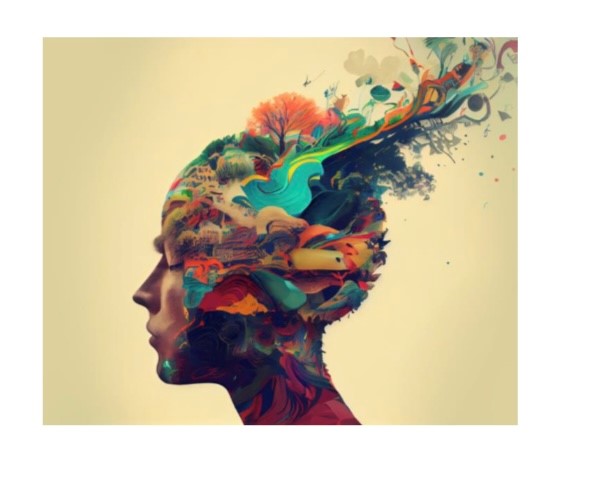I ama firm believer in the power of creativity and after completing the bold Scotland programme I had felt a sense of community, inspired and confident. I went on to explore the effectiveness of arts-based methods to develop social leaders in dementia.
You may already be familiar with arts-based methods but if not, these are things like music, visual art, drama, dance, and storytelling (see Beard, 2012., Downs, Murna & Bowers, 2014). I went on to look at the methods used in the bold Scotland programme and how these helped to create social leaders in dementia, namely through bold partners. These methods took the form of facilitated arts-based group activities.
Arts-based methods can be facilitated on the individual’s strengths; which can provide more inclusive ways to engage with one another, regardless of a dementia diagnosis (Beard, 2012., Downs, Murna & Bowers, 2014).
I aimed to discover how my life experiences relate to the personal impact of bold and to explore the shared themes gathered from bold partners creating meaning. This was done by:
- Gathering data through reflective journalling and reflexivity using autoethnography
- Collecting bold partners experience of the programme through creative hermeneutic analysis
- Comparing this to my personal experience.

The concept of social leaders is taken from Julien Stodd’s social leadership model (see Stodd, 2016) this recognises and includes working together equally to create a supportive network through sharing our individual experiences. Bold Scotland is a social leadership programme, and it stands for bringing out leaders in dementia and bold partners are those who took part in the bold programme and have been affected by dementia.
The methodological underpinning used within the study was autoethnography, this literally means auto’ = Self, ‘etho’ = culture ‘graphy’ = story (see Adams et al, 2022, p3). This method provides connection enabling learning through a personal narrative. In short it tells a story of how individual experiences can be used to help further understand how we are affected both by our experiences, what can be learned from our reactions, and previous life experience while showing how it relates to others (see Leavy, Ellis and Adams, 2020)
Collecting data
Watch this short video to see how data was gathered, used, and analyzed.

Community
I was able to see that the safe place and sense of community I had felt within bold had also been felt by other bold partners; through the resulting wider community that had been formed. I learned ways this had been felt, through support, empathy, and the ability to ask each other’s views through the sharing of experiences.
One carer had felt being able to ask those with lived experience of dementia to help inform the ways in which their carer role was fulfilled. While another partner felt a little uncomfortable, as they were the only person living with dementia, this brings out the importance of finding ways to encourage those living with dementia to have a role in such programmes.

Connection
There was an overlap in themes as a result of the bold community, connections were formed. These enabled the forming of networks and wider projects out with original partners in the form of things like bold mini commissions; these are small bold funded community projects which are ran by bold partners. Providing a platform for different cohorts to form a wider connection and developing communities further.
Transforming
There had been noted transformation both individually and collectively within the communities that had been formed. Some who didn’t view themselves as creative had been able to tap into creativity and had found it fun, becoming less apprehensive.
The bold platform had also enabled self-belief, building confidence to enable social leadership by informing the various role of partners. I had been a recipient of this transformative change, and I felt a newfound confidence.

I was able to see that, the arts-based methods were used as a platform to enable both equality of voice and social leaders to be created within a group setting. This led to communities developing, connections being formed and transformation; whether this be individually or part of a wider group.
It highlighted that these methods can be effectively used in practice and that social leadership can be used as model. This may have wider implications for embedding in practice/policy for dementia support/care to help provide ways to make all voices important and taken into consideration.
Further Information
As part of the dissemination of this study further information and a fuller explanation of the study has been published in a series of three blogs on the bold Scotland website. The Capital Theatres Dementia Arts magazine Autumn 2023 addition gives an overview of the resulting themes.
Contributor
Suzie Beresford, Digital Learning & Development Coordinator, Alzheimer Scotland
@suzie_beresford

References
Adams, T.E., Linn, H.J.S. and Ellis, C. (2022) Handbook of autoethnography. New York: Routledge, Taylor & Francis Group.
Beard, R.L. (2012) ‘Art therapies and dementia care: A systematic review’, Dementia, 11(5), pp. 633–656. doi:10.1177/1471301211421090.
Downs, M., and Bowers, B.J. (2014) Excellence in dementia care: Research into practice. Maidenhead, Berkshire, England: McGraw Hill Education/Open University Press.
Leavy, P., Ellis, C., and Adams, T.E. (2020) ‘Practicing the Autoethnography and living the Autoethnographic life’, in The Oxford Handbook of qualitive research. 2ed edn. New York: Oxford University Press, pp. 254–276. Stodd, J. (2016) The Social Leadership Handbook. Great Britain: Se


